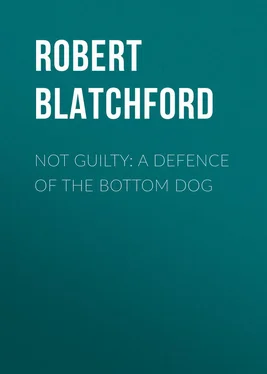Robert Blatchford - Not Guilty - A Defence of the Bottom Dog
Здесь есть возможность читать онлайн «Robert Blatchford - Not Guilty - A Defence of the Bottom Dog» — ознакомительный отрывок электронной книги совершенно бесплатно, а после прочтения отрывка купить полную версию. В некоторых случаях можно слушать аудио, скачать через торрент в формате fb2 и присутствует краткое содержание. Жанр: foreign_antique, foreign_prose, на английском языке. Описание произведения, (предисловие) а так же отзывы посетителей доступны на портале библиотеки ЛибКат.
- Название:Not Guilty: A Defence of the Bottom Dog
- Автор:
- Жанр:
- Год:неизвестен
- ISBN:нет данных
- Рейтинг книги:3 / 5. Голосов: 1
-
Избранное:Добавить в избранное
- Отзывы:
-
Ваша оценка:
- 60
- 1
- 2
- 3
- 4
- 5
Not Guilty: A Defence of the Bottom Dog: краткое содержание, описание и аннотация
Предлагаем к чтению аннотацию, описание, краткое содержание или предисловие (зависит от того, что написал сам автор книги «Not Guilty: A Defence of the Bottom Dog»). Если вы не нашли необходимую информацию о книге — напишите в комментариях, мы постараемся отыскать её.
Not Guilty: A Defence of the Bottom Dog — читать онлайн ознакомительный отрывок
Ниже представлен текст книги, разбитый по страницам. Система сохранения места последней прочитанной страницы, позволяет с удобством читать онлайн бесплатно книгу «Not Guilty: A Defence of the Bottom Dog», без необходимости каждый раз заново искать на чём Вы остановились. Поставьте закладку, и сможете в любой момент перейти на страницу, на которой закончили чтение.
Интервал:
Закладка:
Those quotations should be enough to show Darwin's idea of the origin of the social, or moral, feelings. But I shall quote besides Haeckel's comment on Darwin's theory.
Speaking of the "Golden Rule" in his Confessions of Faith of a Man of Science , Haeckel says:
In the human family this maxim has always been accepted as self-evident; as ethical instinct it was an inheritance derived from our animal ancestors. It had already found a place among the herds of apes and other social mammals; in a similar manner, but with wider scope, it was already present in the most primitive communities and among the hordes of the least advanced savages. Brotherly love – mutual support, succour, protection, and the like – had already made its appearance among gregarious animals as a social duty; for without it, the continued existence of such societies is impossible. Although at a later period, in the case of man, these moral foundations of society came to be much more highly developed, their oldest prehistoric source, as Darwin has shown, is to be sought in the social instincts of animals. Among the higher vertebrates (dogs, horses, elephants, etc.), the development of social relations and duties is the indispensable condition of their living together in orderly societies. Such societies have for man also been the most important instrument of intellectual and moral progress.
There is a very able article in the March, 1905, issue of the Nineteenth Century , by Prince Kropotkin, the author of Mutual Aid , on Darwin's theory of the origin of the moral sense, in which the striking suggestion is made that primitive man, besides inheriting from animals the social instinct, also copied from them the first rudiments of tribal union and mutual aid. This notion may be gathered from the following picturesque passages:
Primitive man lived in close intimacy with animals. With some of them he probably shared the shelters under the rocks, occasionally the caverns, and very often food…
Our primitive ancestors lived with the animals, in the midst of them. And as soon as they began to bring some order into their observations of nature, and to transmit them to posterity, the animals and their life supplied them with the chief materials for their unwritten encyclopaedia of knowledge, as well as for their wisdom, which they expressed in proverbs and sayings. Animal psychology was the first psychology man was aware of – it is still a favourite subject of talk at the camp fires; animal life, closely interwoven with that of man, was the subject of the very first rudiments of art, inspiring the first engravers and sculptors, and entering into the composition of the most ancient epical traditions and cosmogonic myths…
The first thing which our children learn in natural history is something about the beasts of prey – the lions and the tigers; But the first thing that primitive savages must have learned about nature was that it represents a vast agglomeration of animal clans and tribes; the ape tribe, so nearly related to man, the ever-prowling wolf tribe, the knowing, chattering bird tribe, the ever-busy insect tribe, and on. For them the animals were an extension of their own kin – only so much wiser than themselves. And the first vague generalisation which men must have made about nature – so vague as to hardly differ from a mere impression – was that the living being and his clan or tribe are inseparable. We can separate them — they could not; and it seems even doubtful whether they could think of life otherwise than within a clan or a tribe…
And that man who had witnessed once an attack of wild dogs, or dholes, upon the biggest beasts of prey, certainly realised, once and for ever, the irresistible force of the tribal unions, and the confidence and courage with which they inspire every individual. Man made divinities of these dogs, and worshipped them, trying by all sorts of magic to acquire their courage.
In the prairies and the woods our earliest ancestors saw myriads of animals, all living in clans and tribes. Countless herds of red deer, fallow deer, reindeer, gazelles, and antelopes, thousands of droves of buffaloes and legions of wild horses, wild donkeys, quaggas, zebras, and so on, were moving over the boundless plains, peacefully grazing side by side. Even the dreary plateaus had their herds of llamas and wild camels. And when man approached these animals, he soon realised how closely connected all these beings were in their respective droves or herds. Even when they seemed fully absorbed in grazing, and apparently took no notice of the others, they closely watched each other's movements, always ready to join in some common action. Man saw that all the deer tribe, whether they graze or merely gambol, always kept sentries, which never release their watchfulness and never are late to signal the approach of a beast of prey; he knew how, in case of a sudden attack, the males and the females would encircle their young ones and face the enemy, exposing their lives for the safety of the feeble ones; and how, even with such timid creatures as the antelopes, or the fallow deer, the old males would often sacrifice themselves in order to cover the retreat of the herd. Man knew all that, which we ignore or easily forget, and he repeated it in his tales, embellishing the acts of courage and self-sacrifice with his primitive poetry, or mimicking them in his religious tribal dances…
Social life – that is, we , not I – is, in the eyes of primitive man, the normal form of life. It is life itself . Therefore "we" must have been the normal form of thinking for primitive man: a "category" of his understanding, as Kant might have said. And not even "we," which is still too personal, because it represents a multiplication of the " I's ," but rather such expression as "the men of the beaver tribe," "the kangaroo men," or "the turtles." This was the primitive form of thinking, which nature impressed upon the mind of man.
Here, in that identification, or, we might even say, in this absorption of the "I" by the tribe, lies the root of all ethical thought. The self-asserting "individual" came much later on. Even now, with the lower savages, the "individual" hardly exists at all. It is the tribe, with its hard-and-fast rules, superstitions, taboos, habits, and interests, which is always present in the mind of the child of nature. And in that constant, ever-present identification of the unit with the whole lies the substratum of all ethics, the germ out of which all the subsequent conceptions of justice, and the still higher conceptions of morality, grew up in the course of evolution.
Besides these excellent contributions to the subject, Prince Kropotkin gives us other new and striking thoughts, bearing upon the parental source of the social feelings indicated by Darwin. But first let us go back to Darwin. In Chapter Four of The De-scent of Man Darwin says:
The feeling of pleasure from society is probably an extension of the parental or filial affections, since the social instinct seems to be developed by the young remaining for a long time with their parents, and this extension may be attributed in part to habit, but chiefly to natural selection. With those animals which were benefited by living in close association, the individuals which took the greatest pleasure in society would best escape various dangers, whilst those that cared least for their comrades, and lived solitary, would perish in greater numbers.
Dr. Saleeby, in the Academy in the spring of 1905, had some interesting remarks upon the origin of altruism. He "finds in the breast of the mammalian mother the fount whence love has flowed," and points out that the higher we go in the mammalian scale the more dependent are the young upon their mothers.
Читать дальшеИнтервал:
Закладка:
Похожие книги на «Not Guilty: A Defence of the Bottom Dog»
Представляем Вашему вниманию похожие книги на «Not Guilty: A Defence of the Bottom Dog» списком для выбора. Мы отобрали схожую по названию и смыслу литературу в надежде предоставить читателям больше вариантов отыскать новые, интересные, ещё непрочитанные произведения.
Обсуждение, отзывы о книге «Not Guilty: A Defence of the Bottom Dog» и просто собственные мнения читателей. Оставьте ваши комментарии, напишите, что Вы думаете о произведении, его смысле или главных героях. Укажите что конкретно понравилось, а что нет, и почему Вы так считаете.












